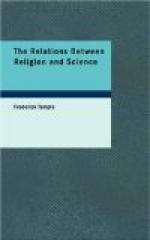External evidences of revealed religion must have a high place but cannot have the highest. A revealed religion must depend for its permanent hold on our obedience and our duty on its fastening upon our spiritual nature, and if it cannot do that no evidences can maintain it in its place.
This account of the fundamental beliefs of Religion when compared with the fundamental postulates of Science shows that the two begin with the same part of our nature but proceed by opposite methods. Both begin with the human will as possessing a permanent identity and exerting a force of its own. But from this point they separate. Science rests on phenomena observed by the senses; Religion on the voice that speaks directly from the other world. Science postulates uniformity and is excluded wherever uniformity can be denied, but compels conviction within the range of its own postulate. Religion demands the submission of a free conscience, and uses no compulsion but that imposed by its own inherent dignity. Science gives warnings, and if you are capable of understanding scientific argument, you will be incapable of disbelieving the warnings. Certain things will poison you; certain neglects will ruin your health; disregard of scientific construction will bring your roof down on your head; to enter a burning building will risk your life; some of these things you may learn by ordinary experience, some of them by that combination of experience which is called Science. But if you are capable of the necessary reasoning you cannot doubt, however much you may wish to do so. And yet to defy these warnings and take the inevitable consequences of that defiance may be your highest glory. Religion also gives warnings; it assures you that the Eternal Moral Law is supreme; that, sooner or later, those who disobey will find their disobedience is exactly and justly punished; that no appearance to the contrary presented by experience can be trusted. But Religion will not compel you to believe any more than Science will compel you to obey. Disbelieve if you choose and Religion will do nothing but perpetually repeat its warnings and add that your disbelief has lowered you in the scale of being. So too Science gives promises; it promises, to the race rather than to the individual, life on easier conditions, and of greater length; fewer pains, fewer diseases; perpetually increasing comforts; perpetually increasing power over nature. And Science is sure to keep the promises. And yet we may refuse to accept the promises, and it is conceivable that the refusal may be far nobler than the acceptance. And Religion promises also. It promises stainless purity in the soul; and truth and justice and unfailing love; and tenderness to every creature that can feel; and a government of all that is under our dominion with a single eye to the service of God. And we may refuse to believe these promises or to care whether they are kept or not. But the refusal or pursuit of such aims as these determines our position in the judgment of the Supreme and in the court of our own conscience.




